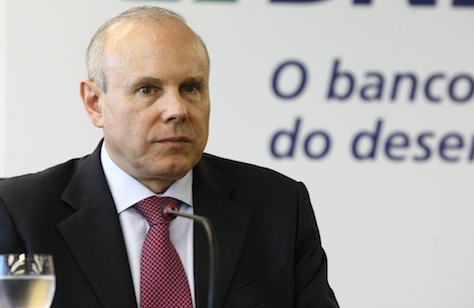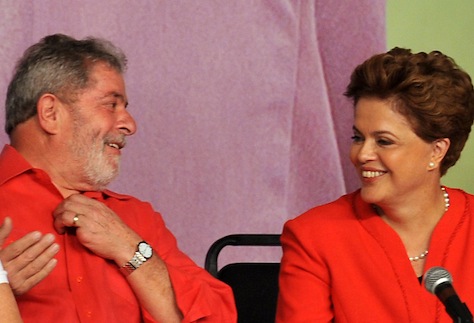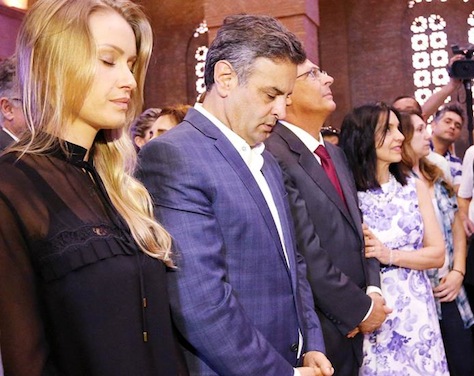Plagued by corruption scandals, a sinking Brazilian economy, protests from young voters who scorn politics as usual and howls from an investor class that has lost faith in her ability to govern effectively, Brazilian president Dilma Rousseff could become the first president to lose reelection since the return of democracy to Brazil in 1985.![]()
In the first round of the Brazilian elections on October 5, she led the presidential vote against her center-right rival Aécio Neves by a margin of 41.59% to 33.55%, and she effectively vanquished former environmental minister Marina Silva, who emerged in late August as the chief threat to Rousseff’s reelection.
* * * * *
RELATED: Five things Neves must do to win the Brazilian presidency
* * * * *
Rousseff now faces a united opposition front — Silva earlier this week endorsed Neves, the candidate of the opposition Partido da Social Democracia Brasileira (PSDB, Brazilian Social Democracy Party). Notably, Rousseff’s governing Partido dos Trabalhadores (PT, Workers Party) lost 18 seats in the lower house of the Brazilian national congress.
Accordingly, Rousseff faces a tough fight against Neves, the popular former Minas Gerais governor, and polls show that she very narrowly trails Neves in the October 26 runoff.
As in any election, however, an incumbent like Rousseff has a strong case. Here are the four things she must do to maximize her bid for reelection and a fourth term for the PT.
1. Lula, Lula, Lula.
If the challenge for Neves is to assure voters that he won’t dismantle the gains of 12 years of PT rule for Brazil’s poor and working class, the challenge for Rousseff is to pummel the notion that she represents the most direct link to the most popular Brazilian leader since the end of military dictatorship in 1985 — and maybe Latin America’s most popular leader today. There’s no doubt that Lula, who hasn’t been on the ballot since 2006, still casts the largest shadow of all in Brazil’s politics.
One of the most successful aspects of Rousseff’s campaign against Silva was in sewing doubts among soft Silva supporters. If you’re worried about retaining the poverty reduction that the PT has prioritized, why chance it by voting for Silva when Rousseff represents a much safer vote?
Even though Neves has scoffed that his administration would harm the poor, Rousseff’s argument boils down to this: why risk a watered-down version of lulismo when Dilma’s reelection amounts to the real thing? It helps to have the former president actively campaigning on Rousseff’s behalf.
2. Rally Brazil’s poor and fragile middle class.
 Photo credit to Ricardo Stuckert.
Photo credit to Ricardo Stuckert.
Neves isn’t likely to win the votes of Brazil’s poor, especially those who have consistently flocked to the PT for the past two decades as the best hope for the kind of public investments that have sharply reduced poverty, especially extreme poverty. That includes the Bolsa Familia cash handouts to Brazil’s poorest families — but also for better health care, education, clean water, food and other necessities. That’s as true for the residents of urban favelas as for the rural poor of Brazil’s nordeste, which has become a nearly impregnable vote bank for the PT (with the possible exception of the state of Pernambuco, where the late Eduardo Campos served as governor until he launched his presidential bid earlier.
Even though Lula da Silva and Rousseff have courted business elites in government, the hopes of the poor have not been misplaced. Though poverty has been reduced across all of Latin America over the past decade and a half, Brazil (and Lula da Silva) essentially developed the model for symbiotic, dual-track emphasis on economic growth and social welfare.
Those voters may not yet feel the full force of the pain of an economic slowdown, but they will if the country’s inflation slips higher or the economy enters a full recession. Though unemployment remains relatively low by European or even US standards, it’s not hard to imagine job growth collapsing rapidly in the worst-case scenario for the Brazilian economy.
The risk to Rousseff isn’t that those voters will flock to Neves, but that through complacency, disengagement or disenchantment, they won’t turn out in the same numbers. Notably, Rouseff won 47.65 million votes in the 2010 election’s first round — she won just 43.27 million in 2014.
3. Demonize Neves as a pawn of the neoliberal and the wealthy.
Unlike Lula da Silva, Marina Silva or even Rousseff, Neves isn’t the kind of candidate who easily conveys a common touch. He’s a wealthy Brazilian who comes from a long political pedigree, has been involved in politics since the mid-1980s and hails from the rich southeastern heartland of Minas Gerais.
While he is still a more attractive and engaging candidate than the PSDB’s 2010 standard-bearer, former São Paulo state governor and São Paulo city mayor José Serra, Neves has struggled to form an emotional connection with the Brazilian electorate.
That’s a crucial weakness that Rousseff must grasp, and she must do so by tying Neves to the most negative aspects of the economic policies introduced by the previous PSDB administration of Fernando Henrique Cardoso between 1994 and 2002. It’s why, in the presidential debate earlier this week, Rousseff seemed to be running just as much against Cardoso (now 83 years old and retired) as Neves.
Cardoso and Lula da Silva had a long history working together to topple the hard-right military leaders that governed Brazil between 1964 and 1985, and Cardoso’s policies reduced inflation and liberalized Brazil’s markets, paving the way for the development of the Lula era. But Cardoso presided over greater poverty and unemployment and, fairly or not, is tarred as an elitist proponent of long-derided neoliberal policies.
4. Allay fears over Brazil’s plummeting economy and corruption.
 Photo credit to Fabio Motta / Agencia Estado.
Photo credit to Fabio Motta / Agencia Estado.
Rousseff could stand to gain a lot of credibility by admitting that her economic policy hasn’t been as successful as it could have been, and she should publicly state that in her second term, she will appoint a new finance minister to replace the long-serving Guido Mantega (pictured above), who has become a millstone around the Rousseff government’s neck, with economic growth at a standstill and inflation nearing 7%. At this point, those economic conditions threaten the PT’s 12-year-legacy of reducing poverty than anything else, including a Neves victory.
Mantega has served in the role for eight years, dating back to earlier times when Brazil was growing on the strength of its commodities boom. If she wins reelection, Rousseff will almost certainly be forced to reconsider her government’s second-term economic policy, and the clearest way to show that would be to appoint a new finance minister.
But Rousseff should also admit that her party has a spotty record on corruption. Though she forced a handful of government ministers out of office when she took power in 2010, Rousseff has struggled to fulfill the demands of protesters last summer who took issue with government corruption, and the latest allegations of kickbacks to PT and other government coalition politicians from the state oil company Petrobras, have been devastating to Rousseff’s campaign. On the strength of her good-faith attempt to clean house four years ago, Rousseff should frankly and openly admit that she hasn’t done a good enough job in reducing corruption and rededicate her second term to improving Brazil’s record on this count.


